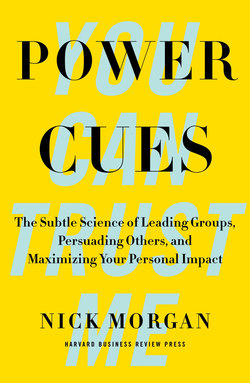Читать книгу Power Cues - Nick Morgan - Страница 7
На сайте Литреса книга снята с продажи.
We’re Not Aware of Our Most Important Activities
ОглавлениеMost of our communication is indeed unconscious. Our conscious brains can handle something like forty bits of information a second. That sounds like a lot until you know that our unconscious minds can handle 11 million bits of information per second.3 So we’ve evolved to push much of our behavior down to our unconscious minds because they can handle these important chores so much more powerfully and rapidly.
Within those constraints, by far the biggest activity the brain undertakes is handling visual input. Visual data can be as much as 10 million bits of information per second out of that 11 million.4 Yet, despite all that computing power and effort, we don’t see reality. What we “see” are the mental images our brains put up in response to the visual input. In essence, the brain gets the visual stimuli, then scans its data banks to find the closest approximate forms that correspond to the visual data. Our minds then offer that stored image as an interpretation of reality. That’s what our brains think they see. For example, in a field of view in which most things are still and one thing is moving, the brain doesn’t bother to get input on all the still stuff, just the moving item.5
This kind of triage of visual input has evolved to such an extent because it’s essential to our basic survival. It’s part of how we’re able to act before our conscious minds realize exactly what’s happening. For example, if something dangerous is thrown at you and you duck without thinking, getting out of the way a split second before it could hurt you, that’s your unconscious mind at work. If you move at virtually the same instant and with the same gesture as someone you love, that’s your unconscious mind at work. And if you get a suddenly powerful gut feeling that the person across from you is concealing an important feeling or piece of news, that’s your unconscious mind at work.
In the first instance, the conscious mind would be too slow to react. In the second and third instances, you’d simply have a much harder time relating well with others.
Precisely because all of this mental activity is unconscious, we’re not aware of it until it has already started to happen. Studies show, in fact, that we make most decisions unconsciously and only become aware of them consciously afterward, once we already start acting on that decision. The delay can be as long as nine seconds.6
In short, for most of the things that matter, your unconscious mind rules you, not the other way around.
That should disturb you.
The idea chips away at the sense of personal autonomy you have, the sense that you’re a sentient being in charge of what you think and how you feel. And, what’s most important, the sense that you’re aware of what’s going on with you and around you.
In fact, your unconscious mind is in charge. That part of you that you’re aware of, that you think of as you, is a chip of ice on top of the tip of the proverbial iceberg that is a human being.
But what if you could learn to become aware of the important parts of this unconscious mental activity? What if you could learn to read it in others’ minds? And what if you could control conversations, meetings, and all sorts of interactions among the people around you, using that conscious awareness of everyone’s unconscious minds, including your own?
What if you could walk into a room and effortlessly (or apparently effortlessly) take charge of it? What if you could switch on charisma at will, making all heads swivel in your direction when you walk into that room? What if you could become the natural leader—the go-to person—of most of the groups that you join?
What if you could learn the essential power cues that will enable you to master virtually any situation where you want or need to be in control?
Would that be worth the effort?
